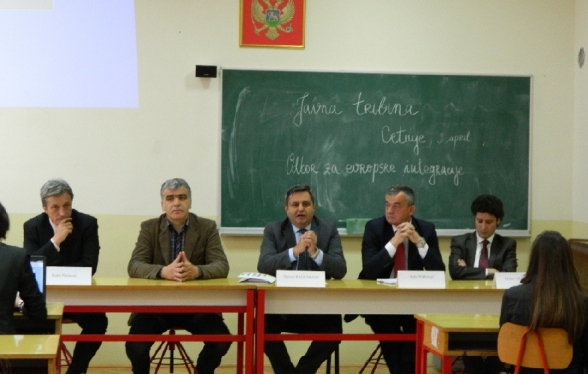Chairman and members of the Committee on European Integration held the public debate today with gymnasium students during which they presented the idea of European unity and benefits resulting from membership in the EU. It was pointed out on this occasion that the full implementation of the European legislation, following the procedure of approximation, refer to all the benefits that society can expect from the membership in the Union.
- The fact that the path to the European Union is not a simple one is showed by the complex mechanism of rules and regulations, that need to be introduced into the legal system of our country, said the MPs. They added that although the Government is the one conducting the negotiations, the role of the Parliament is important in terms of following them, during which the preservation of national interests and traditional values must be taken into account.
Students were interested about whether Montenegrin economy was competitive for the challenges that lay ahead, whether the education system was set up on the basis which correspond to the future European market, and whether the Montenegrin tourist offer was at the level states of the European Union had.
After the questions and comments of students, who have demonstrated great knowledge of the process of European integration, during which they reflected on what their population was particularly interested in, the public debate concluded that spreading awareness about European values among young people was important for the future of Montenegro. After the public debate, the Committee Chairman, Mr Slaven Radunović, gave an interview for the Cetinje Gymnasium school newspaper.
During the meetings of members of the Committee with the management of the Old Royal Capital Cetinje, it was pointed out that it was this municipality that among others in Montenegro, at the local level, first formed the Department for European Integration, which was primarily responsible for application of projects from pre-accession funds. Through inter-municipal and cross-border cooperation, the Old Royal Capital materializes the status of the state in the process of European integration, using the aid funds at its disposal. Active attitude of the municipality towards this issue is reflected in the number of projects that have been successfully implemented or the projects which implementation has been planned, which are mostly financed from these funds, among which the design for the sewage system and improving energy efficiency in buildings of cultural and historical importance stands out.
Members of the Parliament assessed that the Old Royal Capital Cetinje could serve as an example to other municipalities when the efficiency in the use of EU funds was in question. They called on the management of the Capital, to convey their positive experiences in the use of EU funds to other parliamentarians at the meeting of the European Integration Parliamentary Committees of States Participating in the Stabilization and Association Process in South-East Europe (COSAP), to be organized in June by the Committee for European Integration.
The Chairman, Mr Slaven Radunović and members Mr Srđa Popović, Mr Koča Pavlović and Mr Dritan Abazović participated in today’s activities of the Committee.









